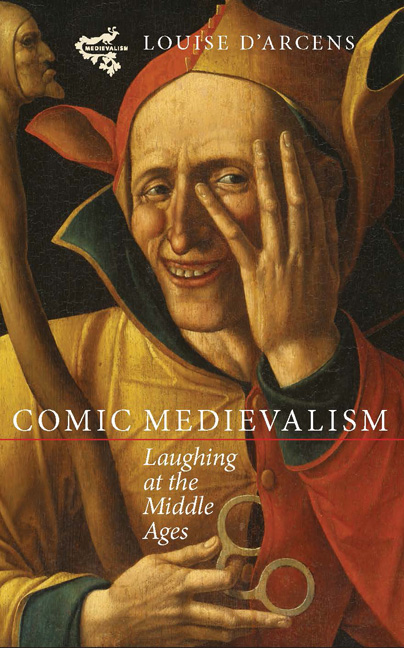Book contents
- Frontmatter
- Dedication
- Contents
- Illustrations
- Acknowledgements
- I THE SET UP
- II OLDIES BUT GOODIES: COMIC RECOVERY
- III HIT AND MYTH: PERFORMING AND PARODYING MEDIEVALISM
- 4 Pre-Modern Camp and Faerie Legshows: Travestying the Middle Ages on the Nineteenth-Century Stage
- 5 Up the Middle Ages: Performing Tradition in Comic Medievalist Cinema
- IV THAT'S EDUTAINMENT: COMEDY AND HISTORY
- Afterword: Laughing into the Future
- Bibliography
- Index
5 - Up the Middle Ages: Performing Tradition in Comic Medievalist Cinema
from III - HIT AND MYTH: PERFORMING AND PARODYING MEDIEVALISM
Published online by Cambridge University Press: 05 November 2014
- Frontmatter
- Dedication
- Contents
- Illustrations
- Acknowledgements
- I THE SET UP
- II OLDIES BUT GOODIES: COMIC RECOVERY
- III HIT AND MYTH: PERFORMING AND PARODYING MEDIEVALISM
- 4 Pre-Modern Camp and Faerie Legshows: Travestying the Middle Ages on the Nineteenth-Century Stage
- 5 Up the Middle Ages: Performing Tradition in Comic Medievalist Cinema
- IV THAT'S EDUTAINMENT: COMEDY AND HISTORY
- Afterword: Laughing into the Future
- Bibliography
- Index
Summary
At the end of Michael Kidd's 1958 musical comedy Merry Andrew, the amateur archaeologist Andrew Larabee, played with customary hapless charm by Danny Kaye, faces a difficult choice: whether to return to school teaching or pursue his newly discovered facility as a natural clown. His dilemma is resolved when his father reveals that Andrew's clowning skills have an honourable pedigree, having been inherited from a distant ancestor, Thomas Larabee, who had been jester to a king. As the film's title confirms, Andrew's name signals the atavistic return of a lost ancestral line of ‘merry-Andrews ’, buffonic entertainers associated with London's Bartholomew Fair, whose physical clowning and madcap wordplay were, according to an unconfirmed claim by Thomas Hearne in 1735, epitomised in the antics of ‘merry’ Andrew Borde, humourist and physician to Henry VIII with a posthumous reputation as a kind of Tudor Patch Adams.
By evoking the tradition of the court jester, the film also neatly alludes to a much more recent comic past: only two years earlier Kaye had starred in the well-known musical comedy The Court Jester, directed by Melvin Frank and Norman Panama. As with Merry Andrew, in this film Kaye's character Hubert Hawkins, despite masquerading as jester to the usurper King Roderick as a part of a plot to restore the kingdom's true heir, finds that he has a unique talent for ‘making a fool of [him]self’ through cavorting, banter and facial antics, epitomised in the film's famous patter song, ‘The Maladjusted Jester’.
- Type
- Chapter
- Information
- Comic MedievalismLaughing at the Middle Ages, pp. 112 - 136Publisher: Boydell & BrewerPrint publication year: 2014



